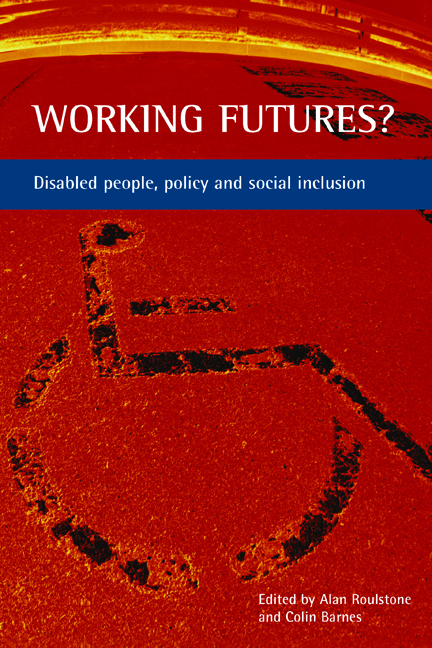Book contents
- Frontmatter
- Contents
- List of figures, tables and boxes
- Preface
- Acknowledgements
- List of abbreviations
- Notes on contributors
- Introduction Working futures: disabled people, employment policy and social inclusion
- Part One Work, welfare and social inclusion: challenges, concepts and questions
- Part Two The current policy environment
- Part Three Towards inclusive policy futures
- Index
- Also available from The Policy Press
twenty two - ‘Work’ is a four-letter word: disability, work and welfare
Published online by Cambridge University Press: 18 January 2022
- Frontmatter
- Contents
- List of figures, tables and boxes
- Preface
- Acknowledgements
- List of abbreviations
- Notes on contributors
- Introduction Working futures: disabled people, employment policy and social inclusion
- Part One Work, welfare and social inclusion: challenges, concepts and questions
- Part Two The current policy environment
- Part Three Towards inclusive policy futures
- Index
- Also available from The Policy Press
Summary
Introduction
This chapter suggests that to overcome the problem of disabled people’s ongoing disadvantage in mainstream employment and, therefore, society, a radical alternative strategy is required that poses a direct challenge to orthodox thinking on work, and associated policies that centre almost exclusively on disabled workers. Building on longstanding analyses from within the disability studies literature, it is argued that an holistic approach is needed that includes:
• the reconfiguration of the meaning of work for disabled people;
• the de-stigmatisation of associate welfare provision;
• that the theoretical and practical foundations for such an approach have already been laid (Barnes, 2000, 2003; Abberley, 2002: Oliver and Barnes, 1998).
This chapter begins with an overview of theoretical considerations with reference to the concept of ‘independent living’ for disabled people and the social model of disability. Attention will then centre on the organisation of labour, the reconfiguring of work for disabled people, and its implications for work and welfare in the 21st century.
Theoretical considerations
As the contributions to this book indicate, disabled people are disproportionately disadvantaged in the labour market. This is because in western society since at least the eighteenth century, work has been organised around a particular set of values and principles; namely, the pursuit and maximisation of profit and competition between individual workers, both of which effectively disadvantage, or disable people with any form of perceived functional limitation/impairment, whether physical, sensory or intellectual. The more overt the impairment, the more severe the disadvantage or ‘disability’ (Finkelstein, 1980; Oliver, 1990; Barnes, 1991; Hyde, 1995; Stiker, 1998; Gleeson, 1999). Hence, in his recent review of work, disability and European social theory Abberley (2002, p 136) has argued that to address the problem of disabled people's exclusion from mainstream society:
We need to develop theoretical perspectives that express the standpoint of disabled people, whose interests are not necessarily served by the standpoint of other social groups, dominant or themselves oppressed, of which disabled people are also members.
The thrust of Abberley's argument is based on three main points:
• that the eradication of environmental and cultural barriers associated with capitalism, will not generate a society in which all people with impairments are able to ‘work’;
- Type
- Chapter
- Information
- Working Futures?Disabled People, Policy and Social Inclusion, pp. 315 - 328Publisher: Bristol University PressPrint publication year: 2005
- 2
- Cited by



